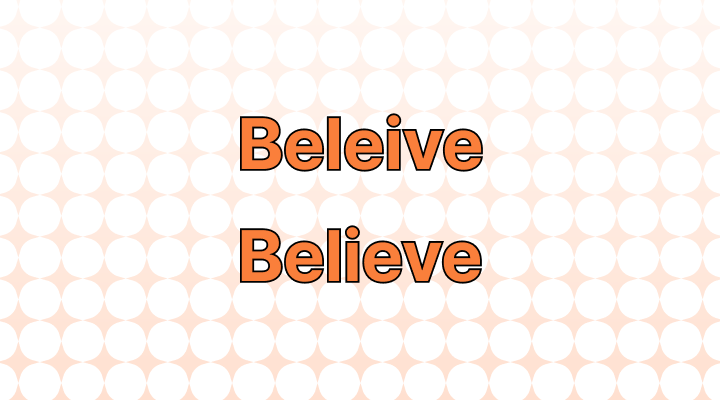"Beleive" is a misspelling of "believe," a verb that means to accept something as true or to have confidence or trust in the existence, truth, or reliability of something or someone.
For example, you may believe a fact or story, like a news report or a detailed anecdote from a friend. You can also believe that something will happen; you can believe that it will be sunny tomorrow. You can also believe in someone or something, meaning you have a firm conviction that someone or something is capable of doing a certain task or playing a particular role.
"Believe" can be difficult to spell because of the "i" next to the "e." For many words in English, people have trouble knowing when to put "i" before the "e" or vice versa. There is a rule of thumb that goes as follows: "I" before "E" except after "C" or when sounded like "ay" as in "neighbor" and "weigh." Although the rule works for many words in English, there are still exceptions to the rule to watch out for, such as "weird," "foreign," and protein."
Through the Google Books Ngram Viewer, we can see that believe has a much higher use than its misspelling beleive in Google’s database of published books in both American and British English since the year 1800.

Example sentences
- She believed in the power of positive thinking to overcome challenges.
- Many people believe in the existence of extraterrestrial life in the universe.
- I believe that honesty is the best policy in all aspects of life.
- John didn't initially believe the news until he saw it confirmed by multiple sources.
- Some cultures believe in the concept of karma, where one's actions determine their future.
- He couldn't believe his luck when he won the lottery.
- Despite the setbacks, she continued to believe in her dream of becoming a successful musician.
- Scientists believe that climate change is a result of human activity.
- It's essential to believe in yourself to achieve your goals.
- The support of family and friends can help you believe in your abilities during difficult times.
Want to sound like a native speaker?
Engram’s AI-powered grammar checker makes your English sound like a native speaker’s, suggesting natural English expressions on top of fixing grammar, spelling, punctuation, word order, and vocabulary.

Reference:
















